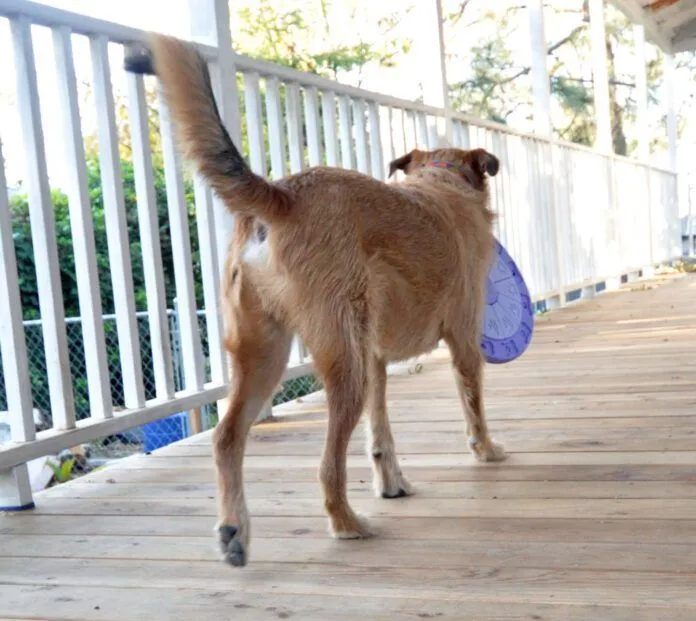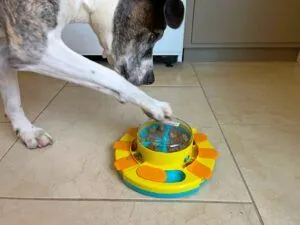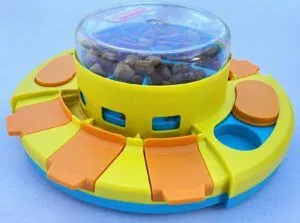Dog puzzle toys are a fantastic way to provide mental stimulation and enrichment for your canine companion, especially larger breeds with a lot of energy. These toys challenge your dog’s problem-solving skills and keep them entertained, preventing boredom and destructive behaviors. But with so many options available, how do you choose the Best Dog Puzzles For Large Dogs? This guide will help you navigate the world of dog puzzles and find the perfect fit for your furry friend.
Understanding Dog Puzzle Toys
Dog puzzle toys come in various forms, each designed to engage your dog in a different way. They generally involve hiding treats or kibble within the toy, which your dog must then figure out how to access. This can involve tasks like sliding compartments, flipping lids, pressing buttons, or a combination of these.
These toys provide several benefits, including:
- Mental Stimulation: Puzzles challenge your dog’s mind, preventing boredom and cognitive decline.
- Slowing Down Eating: For dogs who tend to gulp their food, puzzles can help slow them down, improving digestion and preventing bloat.
- Reducing Anxiety: The focused activity of solving a puzzle can help reduce anxiety and stress in some dogs.
- Preventing Destructive Behavior: By keeping your dog mentally stimulated and engaged, puzzles can help reduce destructive behaviors caused by boredom.
 A brown dog holds a puzzle toy in his mouth.
A brown dog holds a puzzle toy in his mouth.
Choosing the Right Puzzle for Your Large Dog
When selecting dog puzzles for large dogs, there are several factors to consider:
- Durability: Large dogs can be tough on toys, so choose puzzles made from durable materials that can withstand chewing and rough play. Look for options made from hard plastic, reinforced wood, or heavy-duty rubber.
- Size: Ensure the puzzle is appropriately sized for your dog. Small puzzles can be a choking hazard for large breeds, while puzzles that are too small might be easily destroyed.
- Difficulty Level: Start with an easier puzzle and gradually increase the difficulty as your dog becomes more proficient. This will prevent frustration and keep them engaged. Puzzle toys are often rated by difficulty level, ranging from Level 1 (easy) to Level 4 (difficult).
- Type of Puzzle: Consider your dog’s personality and preferences when choosing a puzzle type. Some dogs enjoy sliding puzzles, while others prefer those that require digging or flipping.
Types of Dog Puzzle Toys
Here’s a breakdown of common dog puzzle toy types:
- Treat Dispensing Balls: These toys are simple to use and great for beginners. They have a hole or holes that release treats as the dog rolls the ball around.
- Sliding Puzzles: These puzzles feature compartments that slide open to reveal treats. They require your dog to use their nose or paws to move the sliders.
 A dog places his paw on a puzzle toy.
A dog places his paw on a puzzle toy.
- Flipping Puzzles: These puzzles have compartments covered by lids that flip open to reveal treats. They challenge your dog’s problem-solving skills and dexterity.
- Digging Puzzles: These puzzles have compartments filled with fabric or other materials that your dog must dig through to find the treats. They are great for dogs who enjoy digging.
- Multi-Level Puzzles: These more complex puzzles combine multiple elements, such as sliding, flipping, and digging, to provide a greater challenge.
Introducing Puzzle Toys to Your Dog
When introducing a new puzzle toy, follow these steps:
- Start Easy: Begin with a Level 1 puzzle or a simple treat-dispensing ball.
- Show and Tell: Let your dog watch you fill the puzzle with treats to pique their interest.
- Guide Them: Initially, guide your dog on how to manipulate the puzzle pieces. Use verbal cues and gentle encouragement.
- Supervise Play: Supervise your dog while they play with the puzzle, especially in the beginning. This will prevent them from getting frustrated or destructive.
- Positive Reinforcement: Reward your dog with praise and encouragement when they successfully solve the puzzle.
- Gradual Increase: As your dog becomes more proficient, gradually increase the difficulty level of the puzzles.
 A dog puzzle toy against a white background.
A dog puzzle toy against a white background.
Tips for Success
- Choose the Right Treats: Use high-value treats that your dog loves to keep them motivated.
- Keep it Fresh: Rotate the puzzles regularly to prevent boredom.
- Clean Regularly: Clean the puzzles regularly to prevent the buildup of bacteria and food residue. Dishwasher-safe puzzles are a bonus.
- Be Patient: Some dogs may take longer to figure out puzzles than others. Be patient and provide plenty of encouragement.
Conclusion
Investing in the best dog puzzles for large dogs is an excellent way to provide mental stimulation, prevent boredom, and strengthen the bond with your furry friend. By considering your dog’s individual needs and preferences, you can choose puzzles that will keep them entertained, challenged, and happy for hours. Remember to start with easy puzzles and gradually increase the difficulty as your dog becomes more proficient. With a little patience and experimentation, you’ll find the perfect puzzles to enrich your dog’s life.
